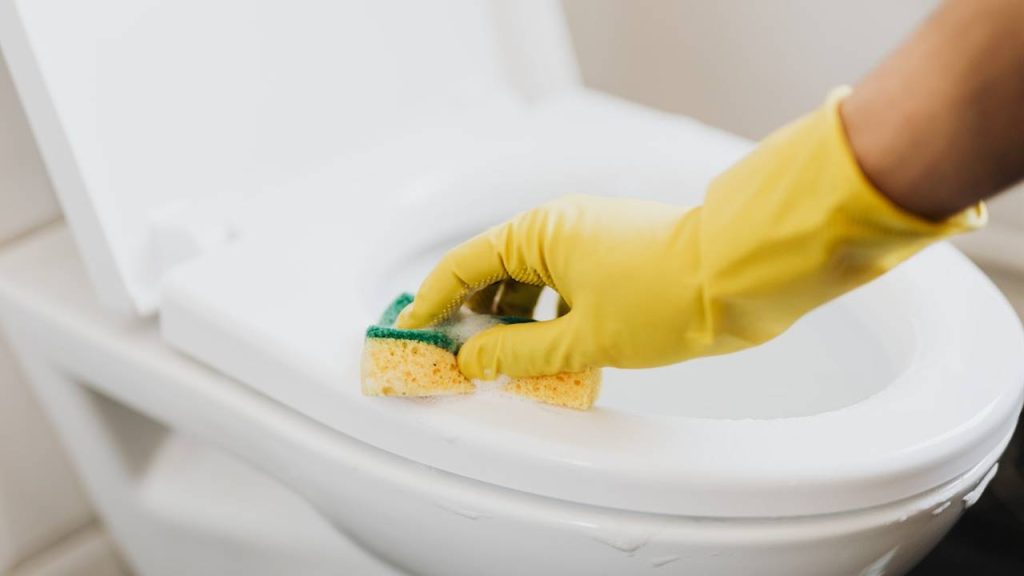For reasons of hygiene, it is necessary to clean the toilet periodically. For this you do not need any aggressive chemical cleaning agent. Natural and homemade products are sufficient.

Cleaning the toilet is not one of the most enjoyable household chores. However, there is no choice but to roll up your sleeves to eliminate urine fouling and bad odors.
No special cleaners or aggressive chemical-synthetic cleaning agents are needed. In fact, many of these abrasives or chemicals are harmful because they scratch or damage the surface of the toilet instead of cleaning it and it gets dirtier and dirtier.
For the sake of the environment, you should use natural homemade products to clean the toilet. You will also relieve your wallet, since many of the home remedies that we present below are usually almost everyone in their home and are cheap.
1. CLEAN THE TOILET WITH VINEGAR
Cleaning vinegar or white table vinegar are natural disinfectants whose acid reliably dissolves limescale deposits. To clean your toilet with vinegar, you simply need to pour it into the dirty toilet, leave it on for about 30 minutes, rub with a brush, and finally rinse with water.
If you have very dirty areas on the toilet seat, grab a cup or two of concentrated cleaning vinegar and spread it out with a clean cloth. Again, let everything absorb for about half an hour before washing the areas with water. In the case of very resistant dirt, it may make sense to leave the product on overnight.
2. ELIMINATE DRY URINE WITH BAKING SODA
Sometimes vinegar is not enough to dissolve intense dirt. If you do not get it, you will need another home remedy to clean the toilet, baking soda.
You can combine this remedy with vinegar to remove even the strongest dirt. You will see that the chemical reaction of vinegar and baking soda produces bubbles. Fear not, they are harmless carbon dioxide. After 15 minutes, rub the scale with the toilet brush.
A cleanser with citric acid and baking soda can help with the most stubborn deposits.
Ingredients:
- 600 ml water
- 2 tablespoons cornstarch
- 2 tablespoons citric acid
- 10 ml of liquid soap (pH value 5.5 to improve surface tension)
Elaboration:
- Mix 500 milliliters of cold water with two tablespoons of cornstarch in a saucepan and bring to a boil stirring constantly until you get a milky and hard dough.
- In a second pot, boil 100 milliliters of water. Let the water cool, then mix it with two tablespoons of citric acid (important: citric acid should not be heated, otherwise poorly soluble calcium citrate is formed, which in turn can lead to deposits).
- Add the liquid soap to the mixture of water and citric acid.
- Finally, mix the contents of both pots and fill a bottle with the bath cleaner.
3. DENTURE CLEANERS HAVE A STRONG ANTI-LIMESCALE EFFECT
If the above solutions have not worked at all, use a denture cleaner to finish the job.
Use only one pill and flush it down the toilet. After an exposure time of about 15 minutes, rub with the brush and pull the chain.
4. DETERGENT POWDER ACTS ON TOILET DIRT
If you want to clean a very dirty toilet, you can also use washing powder for white clothes, which is an excellent remedy for limescale deposits and other debris.
The surfactants it contains dissolve dirt particles to make your toilet shiny again. Pour about half a cup of detergent into the toilet bowl and let it act overnight.
Use detergent with some environmental quality certification, such as Ecocert or European flower.
5. SOAPY WATER FIGHTS BACTERIA
Last but not least, you should also clean the seat and toilet lid. It is best to use a mild soapy solution that does not irritate the skin. Apply this mixture to the lid and toilet seat and then wash it with a soft, clean cloth.
If possible, you should use two cloths to clean the toilet, one for the “surfaces”, that is, the seat and lid of the toilet and the other for the outer side of the ceramic cup.
Microfiber cleaning cloths are especially useful because they can be easily washed in the washing machine at 60 degrees Celsius. To avoid mixing rags, they should be of different colors.
6. CLEAN THE TOILET WITH THE BRUSH
Probably the best-known way to clean the toilet is the brush. For the sake of the environment, you can use a sustainable wood brush to clean your toilet.
If possible, use the brush after each visit to the toilet to remove dirt from the edge before it settles. You can even help yourself with such a brush for hard-to-reach places.
A discarded toothbrush is also very suitable, the bristles are moistened with vinegar or another cleaning agent. This allows you to effectively remove deposits under the edges of the toilet.



